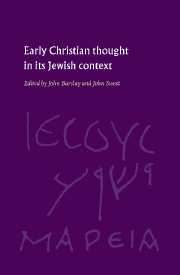Book contents
- Frontmatter
- Contents
- List of contributors
- Preface
- List of works by Morna D. Hooker
- List of abbreviations
- Chapter 1 Introductory Essay
- I THE SOCIAL CONTEXT OF EARLY CHRISTIANITY
- II SOME EARLY CHRISTIAN SOURCES
- III SOME EARLY CHRISTIAN THEMES
- Chapter 14 ‘In accordance with the Scriptures’
- Chapter 15 Land, sanctuary and worship
- Chapter 16 Monotheism and christology
- Chapter 17 Apocalyptic, God and the world.
- Chapter 18 Atonement and martyrdom
- Chapter 19 Halakhah and ethics in the Jesus tradition
- Index of names
- Index of subjects
- Index of texts
Chapter 16 - Monotheism and christology
from III - SOME EARLY CHRISTIAN THEMES
Published online by Cambridge University Press: 22 September 2009
- Frontmatter
- Contents
- List of contributors
- Preface
- List of works by Morna D. Hooker
- List of abbreviations
- Chapter 1 Introductory Essay
- I THE SOCIAL CONTEXT OF EARLY CHRISTIANITY
- II SOME EARLY CHRISTIAN SOURCES
- III SOME EARLY CHRISTIAN THEMES
- Chapter 14 ‘In accordance with the Scriptures’
- Chapter 15 Land, sanctuary and worship
- Chapter 16 Monotheism and christology
- Chapter 17 Apocalyptic, God and the world.
- Chapter 18 Atonement and martyrdom
- Chapter 19 Halakhah and ethics in the Jesus tradition
- Index of names
- Index of subjects
- Index of texts
Summary
The chief characteristic of the message and faith of the followers of Jesus, expressed in the early Christian writings of the first century ce, is ‘Jesu-centricity’. Speaking about God the early Christians had to speak about Jesus, and speaking about Jesus they had to introduce God. ‘Theology’ implied ‘christology’, and ‘christology’ implied ‘theology’. Jesus' followers were Jews and believed in the one and only God who had revealed himself to Abraham, Isaac and Jacob, to Moses and to the prophets. He was the One who had said: ‘I am the lord your God who brought you out of Egypt, out of the land of slavery. You must have no other gods besides me’ (Exod. 20.2–3, cf. Deut. 5.6–7; 6.4–5). But they also believed that this God had revealed himself anew, and decisively, in the words and acts of Jesus, whom he had raised from the dead and exalted to heavenly glory. They hailed the risen Jesus as the heavenly Lord who determined their lives and would appear again to realize God's sovereign rule on earth. In due course they also assigned to him other functions; a number of texts, for instance, emphasize his presence and mediation when God created the world (1 Cor. 8.6; Col. 1.15–17; John 1.1–3).
- Type
- Chapter
- Information
- Early Christian Thought in its Jewish Context , pp. 225 - 237Publisher: Cambridge University PressPrint publication year: 1996



